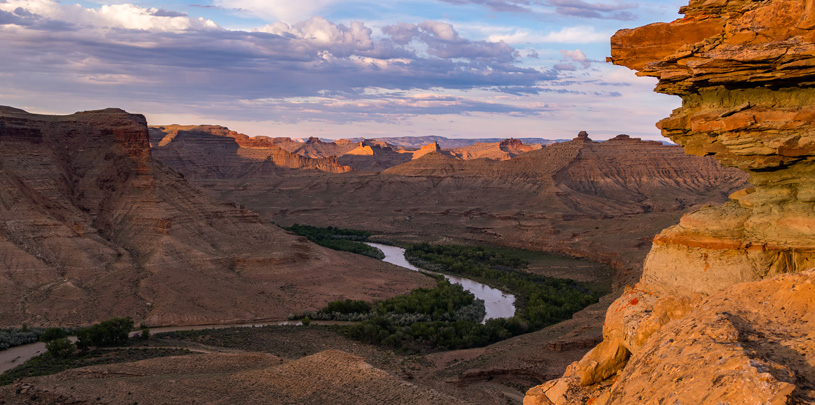
 by Michael Toll, Staff Attorney
by Michael Toll, Staff Attorney
In late 2021, the Grand Canyon Trust filed an administrative protest with the Utah Division of Water Rights as part of a decade-long effort to prevent Enefit American Oil Co., an Estonian state-owned oil shale company, from building a massive oil shale mining and processing facility in northern Utah.
Synthetic crude oil made from oil shale rock is one of the dirtiest and thirstiest fossil fuels on Earth. Enefit’s proposed project — known as the “South Project” — would strip mine up to 9,000 acres of land, dig up more than 800 million tons of oil shale ore rock, and churn out about 547 million barrels of synthetic crude oil over the course of more than 30 years. That crude oil would have well-to-wheel greenhouse gas emissions up to 75 percent higher than those from conventional oil.
 The project would generate hundreds of millions of tons of often-toxic waste rock that can pollute groundwater and nearby surface water — including rivers home to several endangered fish species. It would spew huge amounts of dangerous chemicals and ozone precursors into the air. And it would drain nearly 10 million gallons of water every day from the Green River, above its confluence with the Colorado River. That’s enough water to supply the daily needs of anywhere from about 33,000 households (St. George, Utah) to about 90,000 households (Phoenix, Arizona).
The project would generate hundreds of millions of tons of often-toxic waste rock that can pollute groundwater and nearby surface water — including rivers home to several endangered fish species. It would spew huge amounts of dangerous chemicals and ozone precursors into the air. And it would drain nearly 10 million gallons of water every day from the Green River, above its confluence with the Colorado River. That’s enough water to supply the daily needs of anywhere from about 33,000 households (St. George, Utah) to about 90,000 households (Phoenix, Arizona).
While the Trust’s 2019 lawsuit challenging a U.S. Bureau of Land Management decision to allow Enefit to build pipelines across federal public lands is still awaiting a decision, our administrative water right protest continues to move forward. The protest challenges the water right that is critical to supplying Enefit’s immense water needs at the South Project.
What’s the basis of our protest? Well, it sure looks like the owner of a nearby coal-fired power plant is helping Enefit take advantage of the law to hold onto the 3.5-billion-gallon-per-year water right that should have been forfeited and made available to Utah citizens.
Under Utah law, if a water right holder fails to put a water right to beneficial use within 50 years, that right is forfeited and the water becomes available to the public, a rule designed to prevent would-be water users from indefinitely locking up the public’s water. But there’s an exception: If a wholesale electrical cooperative needs the water to produce electricity for the public’s future power needs, the deadline can be extended.
The massive water right Enefit plans to use at the South Project dates back to 1965, but Enefit has never put the water to beneficial use.
To avoid losing its water right, in 2013, Enefit transferred its water right to Deseret Power, an electrical cooperative that owns the nearby coal-fired Bonanza Power Plant. Deseret Power then did what Enefit couldn’t: it filed a request to extend the deadline for the water right. Deseret Power swore that it needed all the water for new generating units it allegedly planned to build at Bonanza in the next 10 to 20 years. The Utah Division of Water Rights approved the extension beyond 50 years based on Deseret Power’s sworn statements.
But here’s the rub: before Deseret Power sought the extension, it signed a contract entitling Enefit to use the entire water right for oil shale development at the South Project for the more-than-30-year life of the facility. Remember, if not for Deseret Power’s professed need for the water at Bonanza, the water right would have been forfeited and available to the public.
The Trust’s protest with the Utah Division of Water Rights brought all of this to the agency’s attention. We argued that it’s unlawful for Deseret Power to hold onto this water right ostensibly for electricity generation when its deal with Enefit shows that Deseret Power is holding onto the water to help Enefit mine and process oil shale.
At a hearing last July, the agency decided that before addressing the merits of our protest, it first wanted to consider whether the Trust and our co-protestant had “standing” to file a protest — that is, whether we are proper parties to challenge the water right. The Trust pressed our case on this issue, both at the hearing and in several rounds of written briefing filed in the ensuing months.
Briefing wrapped up last November, and now we’re awaiting a decision by the Utah Division of Water Rights on whether our protest can continue to the merits. If it can, we will urge the agency return the water to the people of Utah.
Sign the petition. Drought is stressing groundwater and the Colorado River, which provides water to 40 million people and 5.5 million acres of agriculture across 30 tribal nations, seven U.S. states, and Mexico. Speak up for the Colorado River.
Estonian-owned oil shale giant is barred from siphoning 100 billion gallons of water from a Colorado River tributary.
Read MoreThere's something fishy about the water right for a massive oil shale facility in northern Utah.
Read MoreCould a wild corner of Utah become the site of the nation's first commercial-scale oil shale strip mine and processing plant?
Read More